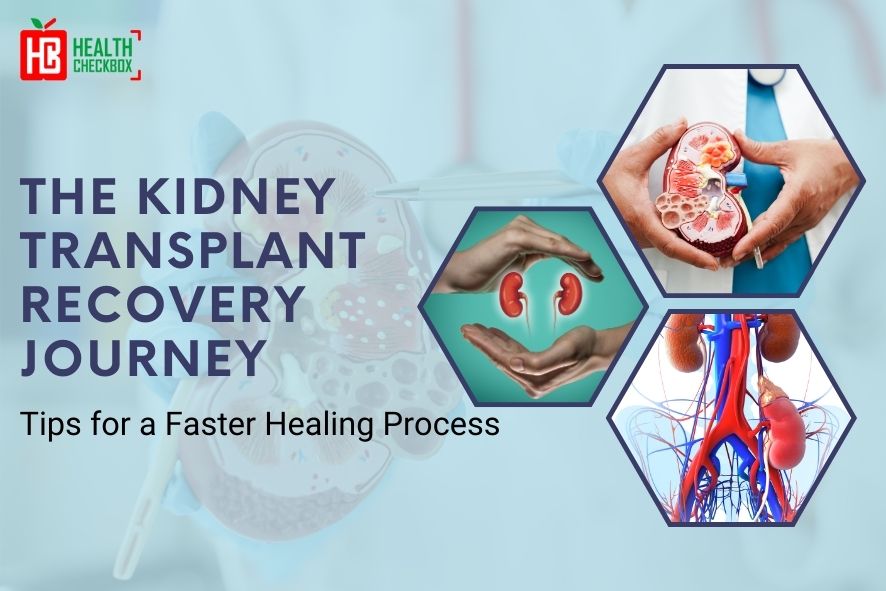For patients who are struggling with renal disease, a kidney transplant treatment is the best option for them, but it is essential to manage their recovery journey after the transplant. This treatment gives an individual another chance in life. This is a life-changing step that restores renal function and improves health. In this article, we will provide you with kidney transplant recovery tips, including why it is important and what to expect.
Kidney replacement is a process in which doctors replace a diseased kidney with a healthier one. After this treatment, recovery from this surgery is very important because there is a chance of organ rejection in the body. Recovery helps boost the new kidney function and makes the patient’s life better than before.
Why is Recovery Important?
Recovery plays a crucial role in preventing organ rejection and healing the treatment area. It boosts the renal function and makes the body regain its older form. The faster an individual recovers from replacement, the faster they can come back to their normal life. Light exercises, regular lab tests, and daily consultation with a doctor can boost your recovery process.
6 Kidney Transplant Recovery Tips
Here are some of the best kidney transplant tips:
Foods to Include & Foods to Avoid After Kidney Transplant
It is essential to know about a healthy recovery diet that helps you in your recovery process. Here are some foods to include and some foods to avoid during the recovery period.
- Foods like Lean meat, Eggs, Nuts, seeds, and tofu can be added to the diet.
- Foods like Grapefruit, pomegranate, and uncooked foods like seafood, meat should be avoided.
Physical Exercises and Activities
Patients need to follow a daily routine of exercises for a better recovery. Exercises like walking and yoga can be the best option for patients who are in their initial stage of the recovery process. These exercises help in increasing muscle strength and reducing high blood pressure in the body. Avoiding heavy exercise is best because it can negatively affect your transplant. Take guidance from your doctor regarding the best exercise during the recovery phase. Sometimes exercises also create problems during the recovery phase.
Medication Management
It is very crucial to manage your medication according to your doctor’s advice. Avoid using those medications that are not suggested by experts. Take the medication that is suggested by the doctor. Avoid skipping medication cycles on your own. Taking anti-rejection medication is best to avoid the chances of organ rejection. But also keep in mind that these medicines can cause skin cancer, so it is important to avoid going in direct sunlight. Take all your medicine exactly as your doctor suggested.
Monitoring Kidney Health
It is essential to check and monitor kidney health after a transplant for a better recovery process. Lab tests are very important to monitor kidney function in the body. In the lab, doctors check for sugar levels in the patient’s body. Taking medicine during the recovery phase sometimes elevates the sugar levels in the body, which affects the kidney recovery process negatively, so managing it is very important. In the last monitoring, energy levels, stress, and sleep also help in reflecting kidney health.
Emotional & Mental Health
Emotional and mental health play an important role during the recovery phase. The more a patient can control their emotions, the greater the chances for better recovery. Some patients are unable to handle thoughts like organ rejection or lifetime medicine consumption, which finally results in negative recovery. So it is crucial to be strong during your recovery process and always listen to your doctor’s advice. Take advice from your medical team on better emotional and mental health. By gaining a positive mindset from the support groups and stress management techniques, you can improve your life.
Avoid Smoking & Alcohol
Smoking & consumption of alcohol can interfere with your recovery & harm the transplanted kidney.
- Smoking is responsible for blood vessel damage & also increases the risk of kidney damage. Seek help to quit smoking if needed.
- Consumption of alcohol can interact with medication and affect liver function, which is critical in processing drugs.
Monitoring Infection Risks and Prevention Tips
Multiple infection risks come in the recovery phase, which can damage the overall body health. Here are some of the infection risks:
- Chest Infection: There are multiple bacterial infections present, which directly target the lungs.
- Urinary Tract Infection: It’s a common type of infection whch treated by antibiotics.
- Fungal Infection: These infection directly targets patients with weak immunity.
Prevention Tips
- Handwashing: Patients need to wash their hands whenever they go to have meals.
- Hand Sanitizer: It is best to use alcohol based sanitizers because they work better than other sanitizers.
- Cough & Sneeze Etiquette: Always cover your mouth and nose before coughing and sneezing.
How to Stay on Track with Long-Term Recovery?
Here are some points to stay on track with long-term recovery:
- Developing a Long-Term Recovery Plan: To stay on track with long-term recovery, it is very important to make a plan. This plan will help you achieve your recovery in time. Patients can include all important things in their plan, such as a balanced diet and monitoring kidney health.
- Staying Motivated: For a long-term recovery, it is very important for a patient to stay motivated. Motivation helps the body recover faster from the treatment.
Conclusion
Recovery plays a vital role in organ transplant treatment because, after treatment, there are multiple complication that comes which affect the treatment. If patients follow a better recovery plan, they can overcome those complications and gain faster recovery. Recovery helps in bringing patients back to their normal lives. So it is essential to make a good recovery plan after treatment.

